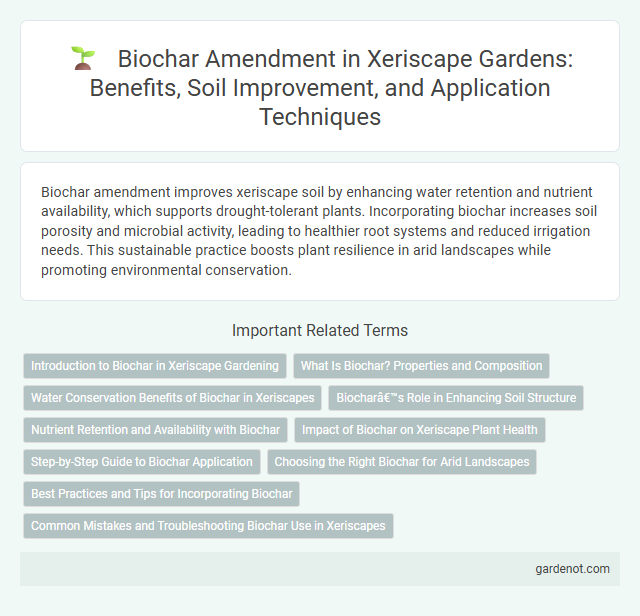Biochar amendment improves xeriscape soil by enhancing water retention and nutrient availability, which supports drought-tolerant plants. Incorporating biochar increases soil porosity and microbial activity, leading to healthier root systems and reduced irrigation needs. This sustainable practice boosts plant resilience in arid landscapes while promoting environmental conservation.
Introduction to Biochar in Xeriscape Gardening
Biochar amendment enhances xeriscape gardening by improving soil structure, moisture retention, and nutrient availability, essential for drought-resistant plantings. Incorporating biochar increases soil carbon content and promotes beneficial microbial activity, supporting sustainable water management in arid landscapes. Research shows biochar reduces irrigation needs while fostering healthy root development in xeric plant species.
What Is Biochar? Properties and Composition
Biochar is a carbon-rich material produced through the pyrolysis of organic biomass under low oxygen conditions, commonly used as a soil amendment in xeriscaping to improve water retention and nutrient availability. Its porous structure enhances soil aeration while its high surface area promotes adsorption of nutrients and beneficial microbes, contributing to long-term soil fertility. Composed mainly of stable carbon, biochar also contains essential minerals such as calcium, potassium, and magnesium, which support plant growth in arid environments.
Water Conservation Benefits of Biochar in Xeriscapes
Biochar amendments enhance water retention in xeriscapes by significantly increasing soil porosity and moisture-holding capacity, reducing irrigation frequency. This improvement in soil structure enables plants to access water more efficiently, supporting drought tolerance in arid landscapes. Studies show biochar can reduce water runoff and evaporation rates by up to 30%, promoting sustainable water conservation in xeriscape gardening.
Biochar’s Role in Enhancing Soil Structure
Biochar amendment significantly enhances soil structure by improving porosity, water retention, and aeration, which are critical for xeriscape landscapes. Its porous nature promotes beneficial microbial activity and nutrient cycling, leading to better root development and drought resilience. Integrating biochar into arid soil conditions reduces compaction and increases organic matter, optimizing water use efficiency in xeriscaping design.
Nutrient Retention and Availability with Biochar
Biochar amendment significantly enhances nutrient retention and availability in xeriscape soils by increasing cation exchange capacity (CEC), which reduces nutrient leaching and promotes sustained nutrient release. Its porous structure improves soil aeration and water retention, facilitating microbial activity that mineralizes nutrients into plant-available forms. Incorporating biochar into arid landscape soils boosts nutrient cycling efficiency, supporting drought-tolerant plant growth and long-term soil fertility.
Impact of Biochar on Xeriscape Plant Health
Biochar amendment significantly enhances xeriscape plant health by improving soil structure, moisture retention, and nutrient availability, which are critical for drought-resistant landscapes. Its porous nature promotes beneficial microbial activity and root growth, leading to increased plant resilience against water stress. Studies indicate that xeriscape plants grown with biochar-amended soil exhibit higher chlorophyll content, improved water use efficiency, and greater biomass production.
Step-by-Step Guide to Biochar Application
Biochar amendment improves soil structure and water retention in xeriscape gardens by increasing porosity and nutrient availability. Begin by selecting high-quality, nutrient-rich biochar, then inoculate it with compost or microbial solutions to activate beneficial microbes before application. Incorporate the prepared biochar into soil at a rate of 10-20% by volume, mixing thoroughly to enhance moisture retention and support drought-resistant plant growth.
Choosing the Right Biochar for Arid Landscapes
Selecting the optimal biochar for xeriscape involves prioritizing feedstock that enhances water retention and nutrient availability in arid soils. High-quality biochar derived from hardwood or agricultural residues improves soil porosity and microbial activity, crucial for drought-prone landscapes. Ensuring the biochar is properly aged or inoculated maximizes its effectiveness by stabilizing pH levels and increasing cation exchange capacity in desert environments.
Best Practices and Tips for Incorporating Biochar
Incorporating biochar into xeriscape gardens enhances soil moisture retention and nutrient availability, optimizing water use efficiency. Best practices include applying biochar at rates between 5% and 10% by volume, thoroughly mixing it into the top 6 to 12 inches of soil to improve aeration and microbial activity. Pre-charging biochar with compost or nutrient-rich amendments before application maximizes its effectiveness and supports sustainable drought-resistant landscaping.
Common Mistakes and Troubleshooting Biochar Use in Xeriscapes
Common mistakes in biochar amendment for xeriscapes include applying biochar without proper pre-conditioning, which can cause nutrient imbalances and inhibit plant growth. Overapplication often leads to excessive soil alkalinity and poor water retention, reducing the effectiveness of drought-tolerant plants. Troubleshooting involves ensuring biochar is properly inoculated with compost or microbial life before use and adjusting soil pH with organic matter to optimize water and nutrient availability.
Biochar amendment Infographic

 gardenot.com
gardenot.com